- Home
- John Bellairs
The Mummy, the Will, and the Crypt
The Mummy, the Will, and the Crypt Read online
MAP OF GLOMUS ESTATE
MAP OF CHOCORUA AREA
THE MUMMY, THE WILL, AND THE CRYPT
by John Bellairs
cover and illustrations by Edward Gorey
digital preservation by Guy Montag
CHAPTER ONE
"Professor, can we go home yet? My feet feel like they're gonna fall off."
"No," said the professor firmly. "We can not go home yet. We still have two more rooms full of pictures to look at, and then there's Mr. Glomus's office. No doubt there are art treasures in there. And if you are ever going to become a cultivated young man, you are going to have to learn to appreciate great art. So come along. You can rest your tired feet later."
"But, Professor..."
"But me no buts, John. If an old coot who's pushing seventy from the wrong side can keep on his feet, so can you. I'd hum a marching song for you, but I'm afraid that guard over there would not be pleased. I'll give you another two minutes to rest, and then we'll have to move on."
Johnny's voice was a despairing wail. "Two minutes?"
"Yes, two minutes. And I'll be counting them on my watch. So relax while you can."
Johnny Dixon and Professor Childermass were sitting on a padded bench in a room full of oil paintings by seventeenth-century Dutch masters with names like Rembrandt and Ruysdael and De Hooch. For hours they had been tramping through the rooms in the vast Glomus mansion—rooms full of the paintings, suits of armor, weapons, and art objects that H. Bagwell Glomus had collected during his long life. Mr. Glomus had been able to collect art because he was rich. And he had gotten rich by starting a cereal company.
A real health nut, Mr. Glomus had invented a cereal drink called Glomar. It was black and looked like coffee, but it was made out of wheat. Even though Glomar tasted terrible, people bought it because they wanted to stay healthy. Later Mr. Glomus invented Oaty Crisps, a cereal that was sort of like Kellogg's Corn Flakes. Oaty Crisps really caught on, and soon Mr. Glomus was able to build a large cereal factory in the town of Gildersleeve, Massachusetts. The factory was right across the street from Mr. Glomus's mansion, and Johnny and the professor had toured it earlier in the day.
Johnny sat still and tried to relax while the professor glowered at his pocket watch, mentally ticking off the seconds. They were an odd pair, these two. Johnny was twelve. He was pale, blond, and freckled, wore glasses, and was rather shy. The professor was short, his nose was red and pitted, and he had muttonchop whiskers that sprouted wildly from the sides of his head. The professor looked crabby, and he actually did have a rotten temper. But he was also a very kind man. He lived across the street from Johnny and his grandparents, and as strange as it may seem, he had become the boy's close friend.
Johnny needed friends. He had a bad habit of avoiding other kids his own age, and after a year of living in the town of Duston Heights, Massachusetts, he had only just begun to change. Most of the time—when he was not at home curled up with a book—Johnny preferred being with the professor.
"Well, time's up! On your feet!" The professor barked out this command and stood up. He stuffed his watch into his pants pocket and turned to Johnny.
"Oh, okay!" Johnny groaned. Wincing, he dragged himself up into a standing position.
However, the professor was not in a sympathetic mood. "What's the matter, John?" he said, in a dry, sarcastic tone. "Is it arthritis or tetanus or frostbite?"
Johnny gave the professor a dirty look. "When this is over with, I want a hot fudge sundae," he muttered sullenly. "Can we go get one?"
The professor smiled as he thought of hot fudge. As Johnny well knew, chocolate was one of the professor's obsessions. "Yes, indeed," he answered, nodding agreeably. "I was planning to do that. There is a wonderful ice cream parlor here in Gildersleeve, and they make big gloppy calorie-filled hot fudge sundaes. We will go there—after we visit Mr. Glomus's office. So march!"
Mr. Glomus's mansion was built like a castle, and his office was at the top of a tower at the northeast corner. Johnny and Professor Childermass had to walk down a corridor, up a flight of marble steps, down another corridor, and up a curving flight of cast iron steps before they finally got there. The furnishings in the large circular room were heavy and gloomy. There was a grandfather clock and two heavy mahogany cabinets with glass windows. Mr. Glomus's desk was made of paneled oak, and it looked as if it weighed a ton. On top was a clock made of black marble. The chairs were massive, with black leather upholstery, and there was a dark green rug. A row of narrow windows ran all the way around the room, and in the top part of each one was a piece of colored glass. Since it was a sunny day, the light that came in threw circles of red and purple and green and blue light on the floor, the only cheerful things to be seen.
As Johnny and the professor entered the room they suddenly realized that they had walked in on a guided tour. Clustered together near the desk was a small group of elderly men and women. The guide, a rather bored-looking young woman with a portable loudspeaker in her hand, was rattling off a speech that she must have memorized. Her voice had a singsongy rise and fall, and from the expression on her face she might as well have been talking about the price of beef in Argentina.
"...and so, in the year 1936, although he had acquired great wealth and built up a thriving business, Mr. Glomus became depressed. He worried and stayed awake nights and began acting strangely. His family doctor advised him to try new things to break out of his rut. So Mr. Glomus began to study demonology and witchcraft, reading all the great books that have been written on this rather sinister subject. He took a trip to Europe and came back with some objects that had once been associated with the practice of witchcraft. Some of these may be seen in the small cabinet by the grandfather clock, including the so-called magic mirror that once belonged to Dr. John Dee, the sixteenth-century sorcerer. But, alas, in spite of his newfound hobby Mr. Glomus continued to feel depressed. And on the evening of November 13, 1936, Mr. H. Bagwell Glomus left his office—this very office that you are standing in—and he went home and drank a mixture of strychnine and cognac. The next morning his servants found him dead on the floor of his bedroom."
Several people gasped. The professor smiled knowingly and nudged Johnny in the ribs.
"Pay attention," he whispered. "This next part is really interesting."
"On the morning following Mr. Glomus's death," the guide went on, "a sealed envelope was found on his desk. In the envelope was a note that revealed the startling fact that Mr. Glomus had not left a will!"
There were more gasps and cries of "Oh, no!" and "How 'bout that!" One old lady with a raspy, irritating voice spoke up and said, "What happened to all his moolah, then?"
The guide coughed and looked pained. "Mr. Glomus's... uh, his money was divided up among his heirs according to the laws of the Commonwealth of Massachusetts. But this is not the end of the story. It seems that soon after Mr. Glomus's death some odd notes were found in his diary. The members of the Glomus family have deduced from them that a will does indeed exist. And they think that Mr. Glomus left behind clues to its whereabouts. The clues are supposedly right here in this very room!"
Immediately everybody in the group began gawking, turning their heads this way and that. But with a smug smile on her face, the guide went on.
"A great effort has been made to keep things in this office exactly as they were on the day Mr. Glomus died. And Mrs. Annabelle Glomus, Mr. Glomus's widow, has offered a reward of $10,000 to anyone who can figure out the hiding place of the will." The guide sighed. "Puzzle experts—people who know about cryptograms and codes—have been brought here from all over the world in an attempt to figure out where the mysterious will is hidden. Many
have tried, but all have failed. It is generally thought, though, that the clues are to be found among this rather odd collection of objects on the library table over there. If you will all follow me, please."
With a lot of shuffling and whispering, the group followed the guide across the room to a large walnut table. The tourists talked a good deal among themselves about the objects. Some of them snapped pictures. Poor Johnny kept trying to get a good look at the table, but he couldn't see a blessed thing. He was blocked by several people, but most of all by a tall and very fat man who wore a New York Yankees baseball cap.
"Now, then," said the guide, smiling politely, "this concludes our tour. There is another group due to arrive in a very few minutes, so I must ask you to follow me downstairs to the main hall, where souvenirs may be purchased. Thank you."
Muttering and snapping still more pictures, the group filed out of the room. Johnny and the professor stepped aside to let them pass. Now the two of them were alone, with no one blocking their view. Johnny looked around. Although he could peer at the tantalizing objects on the table now, he decided to save that for last. With the professor following close behind, he started on a little tour of the room. There was Mr. Glomus's desk, with its gloomy marble clock and some pens and pencils laid out in a neat row on the dusty green blotter. Johnny's gaze traveled along the curve of the wall, past the grandfather clock. Between two windows was a china closet, and next to it stood the cabinet with the witchcraft collection in it. Farther along the wall were some paintings in heavy gilt frames. One showed a sunset scene in the White Mountains of New Hampshire. Another showed the Hudson River near West Point. Then there were some chairs, a marble bust of Mr. Glomus on a fluted column, and finally the library table with its peculiar assortment of objects. Johnny walked up to the table and stood with arms folded, looking down. At the front of the table was a big sign that said do not touch. Behind the sign in one corner of the table was a very handsome walnut-and-ivory chess set. It stood on a polished wooden board, and the pieces were all lined up the way they are at the start of a game. Next to the chess set lay an old, yellowed Greek newspaper. It was folded neatly in half so that the top part of the front page showed. The large black letters at the top told—Johnny figured—the name of the newspaper: ETHNIKOS KHPYX
The second word in the title had a circle drawn around it in red ink. The third item on the table was an old, weathered signboard. It was shield-shaped, with a fancy scalloped border at the top. Johnny could see two rusted screw-eyes sticking out of the top of the board, and he figured that the sign had once hung from a crosspiece on a post or on an iron bracket of some kind. The lettering on the sign was faded, but it could be read. It said YE OLDE TEA SHOPPE. That was it—there was nothing else on the table.
The professor stood watching Johnny with amusement. "Well?" he said in a raspy, needling voice. "Have you figured out where Mr. Glomus's will is? You've had oodles of time."
Johnny gave the professor an exasperated glance. "Aw, come on, Professor! You know darned well that nobody could figure this out! Not even if they had a million and a half years to do it!"
The professor grinned and rubbed his chin. "I will admit," he said dryly, "that the puzzle is a tough one. What possible connection can there be between a chess set, a Greek newspaper, and a sign from somebody's tea shop? Of course, there may not be any connection at all. What I mean is, if I were you, I wouldn't beat my brains out over this ridiculous puzzle. As the young lady pointed out, Mr. Glomus was a bit sick in the head at the end of his life. He may have just wanted to irritate his relatives by holding out the possibility that there was a will after all."
Johnny was about to open his mouth to say something when a mean-looking woman with narrow hornrimmed glasses appeared at the door. "You two will have to leave now," she snapped. "Didn't you hear what the guide said? There's another group due in."
The professor turned to her with a malicious gleam in his eye. He hated bossy, officious people. "Is it your job to be nasty and impolite?" he asked. "Or are you just doing what comes naturally?"
The woman's mouth dropped open, and while she stood there looking astonished, Johnny and the professor walked out past her and down the stairs. As they went, the professor began to chuckle in a self-satisfied way.
A few minutes later Johnny and the professor were sitting in an ice cream parlor that had old-fashioned wooden booths and Tiffany glass lampshades and a marble counter and even a jukebox. The jukebox was playing "Come On-A My House," a song that the professor hated, and he flinched now and then while digging into his hot fudge sundae. Johnny was having a tin roof sundae, which is a hot fudge sundae with peanuts on top. And as he slurped and munched and crunched he felt at peace with the world. But Johnny liked puzzles—chess puzzles and picture puzzles and Chinese puzzles and all the other kinds—and so his mind kept drifting back to Mr. Glomus's office and the mysterious array of objects on the table.
The professor was a shrewd man, and he could tell from the expression on Johnny's face that he was still wrestling with the problem. "Come on, John," he said. "Give it up! It's a puzzle that can't be solved. It's like the Mad Hatter's riddle: Why is a raven like a writing desk? There isn't any solution."
Johnny popped a fudge-covered peanut into his mouth. He chewed it slowly and stubbornly. "Professor," he said thoughtfully, "what do you think would really happen if somebody found Mr. Glomus's will?"
The professor shrugged. "The law divided up Mr. Glomus's estate among his heirs. His wife and his two worthless sons got some money, and so did his two surviving brothers, and his sister. If a will turned up, there'd be fights in court and yelling and screaming, some reshuffling of the money, and then a lot of hatefulness and ill will. It'd be like setting off a bomb in a fireworks factory."
Johnny laughed at the professor's description. But then he paused. "Hey, wait a minute! If it's gonna cause so much trouble to find the will, how come Mrs. Glomus wants to find it?" he said.
The professor licked his spoon pensively. "Well," he said slowly, "I don't know much about Mrs. Glomus, but I suspect she is one of these fussy, finicky types that think everything in life should come out neatly, with straight edges and all. Rich people are supposed to leave wills, and so it may really gripe her to think that her late hubby didn't leave one. Or maybe she's just greedy. She may not be satisfied with the money she got under the present arrangement and may be gambling that she'll get more if a will is found. I don't know. But if I were her, I'd leave things the way they are. If a will is found, she may lose her ten thousand dollars, and more besides."
Suddenly the professor jumped up. "See here, now! I've had enough of chewing over the affairs of the Glomus family. It's time for us to pay up and hit the road, because I have mountains of papers to get through tonight. Term papers! Arrgh! Reams and reams of indigestible nonsense! But they have to be done, I suppose. Come on, John. Let's get a move on."
Later, as the car roared on through the twilight toward Duston Heights, Johnny sat slumped in the front seat with his eyes closed. It had been a busy, exciting day, and now the motion of the car, the droning of the motor, and the whiz of passing cars were putting him to sleep.
CHAPTER TWO
It was a few weeks later, a chilly night in late September. Johnny was walking home from a Monday night Boy Scout meeting at the Methodist church, wearing his new Boy Scout uniform with the red neckerchief and the bright red-and-white numerals 112 sewed on the right shoulder. For months the professor and Johnny's gramma and grandpa had been trying to persuade him to join. They were worried that Johnny was too much of a loner, and they wanted him to break out of his shell and make some friends. And so he had finally signed up with Troop 112. The first meeting had not been much. Before the scoutmaster showed up, the boys spent their time horsing around, playing games of Steal the Bacon (using a knotted towel for the bacon) and throwing the cakes of Ivory soap at each other that they were supposed to be carving into little animals and things like that. But when the
meeting started and things quieted down a bit, Johnny decided he liked the scoutmaster and most of the other boys too. He was stubborn about changing his mind, but he was beginning to think that maybe—just maybe—this Boy Scout business was a good idea.
As Johnny walked on, all sorts of thoughts came crowding into his mind. He thought about his mother, who had been in her grave for over a year now. He thought about his dad, who was flying a jet for the Air Force, over in Korea. The year was 1951, and the Korean War was raging. Mr. Dixon didn't have to be over there, because he had already served in the Air Force in World War Two. Besides, he was the only surviving parent of a dependent child. But he had volunteered anyway, because he liked flying. Johnny did not understand why his dad wanted to do such a dangerous thing. He didn't understand why the Americans had to go help the South Koreans fight the North Koreans and the Chinese Communists. But he did know one thing—he knew that he was scared. Sometimes before he went to bed at night Johnny would imagine seeing his dad's jet plane hurtling through the sky. Suddenly it would burst, exploding in flame and smoke, with pieces flying everywhere. Johnny would close his eyes and shudder. He worried about his dad a lot. Sometimes when the mail arrived on Saturday afternoons, Johnny wondered if there was an official U.S. government telegram in the pile, a telegram that began We regret to inform you...
Johnny wished that he could stop worrying about his dad and just go along with what the professor had told him: There was one big rule in life—the things you worried about never happened, and the things that happened were never the ones you expected. Not that this bit of advice helped Johnny much. It simply meant that he spent more time guessing at what the unexpected disasters in his life would be.
When Johnny started up the walk toward his front door, he was suddenly hit with the chilling feeling that something was wrong. Quickly he glanced toward the big bay window. The window was dark. This was odd, because usually at this time of night Gramma would be in the living room watching TV. The Dixons were poor, and they hadn't had a television set until recently, when Professor Childermass had bought them one as a present. At first Gramma had been suspicious of this newfangled invention, convinced that the rays it emitted were harmful. But before long she was a regular TV addict, watching the Kate Smith Hour, Milton Berle, and soap operas like Search for Tomorrow. But no gray aquarium glow hovered about the walls tonight. Johnny wondered what Gramma was doing.

 The Curse of the Blue Figurine
The Curse of the Blue Figurine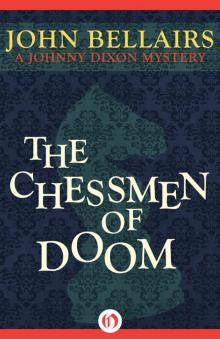 Chessmen of Doom
Chessmen of Doom Secret of the Underground Room
Secret of the Underground Room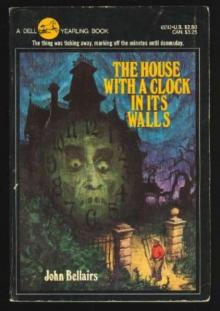 The House With a Clock in Its Walls
The House With a Clock in Its Walls The Vengeance of the Witch-Finder
The Vengeance of the Witch-Finder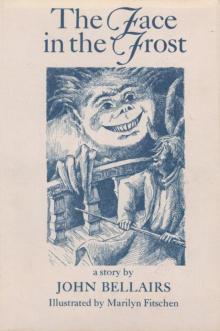 The Face in the Frost
The Face in the Frost Revenge of the Wizard's Ghost
Revenge of the Wizard's Ghost Spell of the Sorcerer's Skull
Spell of the Sorcerer's Skull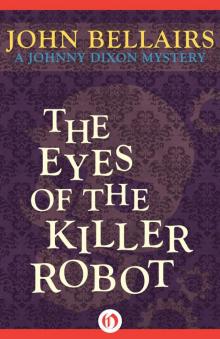 Eyes of the Killer Robot
Eyes of the Killer Robot Mummy, the Will, and the Crypt
Mummy, the Will, and the Crypt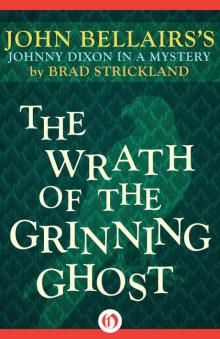 Wrath of the Grinning Ghost
Wrath of the Grinning Ghost The Mansion in the Mist
The Mansion in the Mist The Doom of the Haunted Opera
The Doom of the Haunted Opera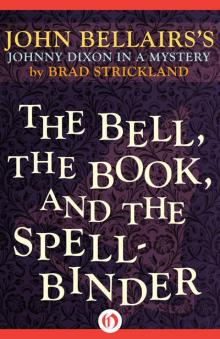 The Bell, the Book, and the Spellbinder
The Bell, the Book, and the Spellbinder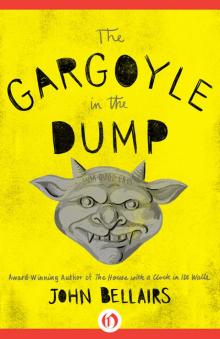 The Gargoyle in the Dump
The Gargoyle in the Dump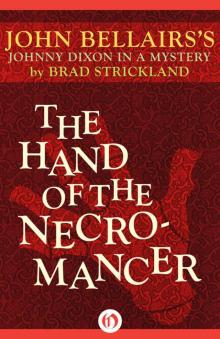 The Hand of the Necromancer
The Hand of the Necromancer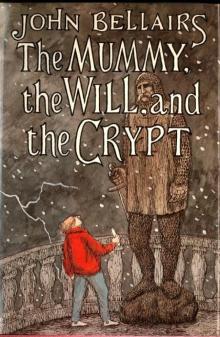 The Mummy, the Will, and the Crypt
The Mummy, the Will, and the Crypt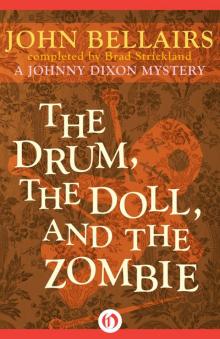 Drum, the Doll, and the Zombie
Drum, the Doll, and the Zombie The Specter from the Magician's Museum
The Specter from the Magician's Museum The Letter, the Witch, and the Ring
The Letter, the Witch, and the Ring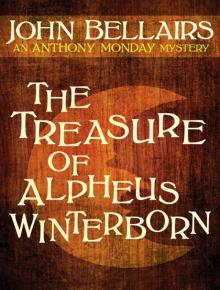 The Treasure of Alpheus Winterborn
The Treasure of Alpheus Winterborn The Dark Secret of Weatherend
The Dark Secret of Weatherend The Figure in the Shadows
The Figure in the Shadows